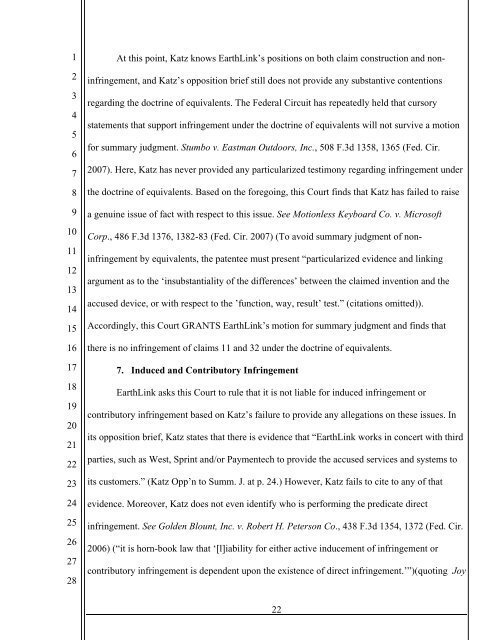Ronald A. Katz Technology Licensing v. Earthlink - IP Spotlight
Ronald A. Katz Technology Licensing v. Earthlink - IP Spotlight
Ronald A. Katz Technology Licensing v. Earthlink - IP Spotlight
Create successful ePaper yourself
Turn your PDF publications into a flip-book with our unique Google optimized e-Paper software.
1<br />
2<br />
3<br />
4<br />
5<br />
6<br />
7<br />
8<br />
9<br />
10<br />
11<br />
12<br />
13<br />
14<br />
15<br />
16<br />
17<br />
18<br />
19<br />
20<br />
21<br />
22<br />
23<br />
24<br />
25<br />
26<br />
27<br />
28<br />
At this point, <strong>Katz</strong> knows EarthLink’s positions on both claim construction and noninfringement,<br />
and <strong>Katz</strong>’s opposition brief still does not provide any substantive contentions<br />
regarding the doctrine of equivalents. The Federal Circuit has repeatedly held that cursory<br />
statements that support infringement under the doctrine of equivalents will not survive a motion<br />
for summary judgment. Stumbo v. Eastman Outdoors, Inc., 508 F.3d 1358, 1365 (Fed. Cir.<br />
2007). Here, <strong>Katz</strong> has never provided any particularized testimony regarding infringement under<br />
the doctrine of equivalents. Based on the foregoing, this Court finds that <strong>Katz</strong> has failed to raise<br />
a genuine issue of fact with respect to this issue. See Motionless Keyboard Co. v. Microsoft<br />
Corp., 486 F.3d 1376, 1382-83 (Fed. Cir. 2007) (To avoid summary judgment of noninfringement<br />
by equivalents, the patentee must present “particularized evidence and linking<br />
argument as to the ‘insubstantiality of the differences’ between the claimed invention and the<br />
accused device, or with respect to the ’function, way, result’ test.” (citations omitted)).<br />
Accordingly, this Court GRANTS EarthLink’s motion for summary judgment and finds that<br />
there is no infringement of claims 11 and 32 under the doctrine of equivalents.<br />
7. Induced and Contributory Infringement<br />
EarthLink asks this Court to rule that it is not liable for induced infringement or<br />
contributory infringement based on <strong>Katz</strong>’s failure to provide any allegations on these issues. In<br />
its opposition brief, <strong>Katz</strong> states that there is evidence that “EarthLink works in concert with third<br />
parties, such as West, Sprint and/or Paymentech to provide the accused services and systems to<br />
its customers.” (<strong>Katz</strong> Opp’n to Summ. J. at p. 24.) However, <strong>Katz</strong> fails to cite to any of that<br />
evidence. Moreover, <strong>Katz</strong> does not even identify who is performing the predicate direct<br />
infringement. See Golden Blount, Inc. v. Robert H. Peterson Co., 438 F.3d 1354, 1372 (Fed. Cir.<br />
2006) (“it is horn-book law that ‘[l]iability for either active inducement of infringement or<br />
contributory infringement is dependent upon the existence of direct infringement.’”)(quoting Joy<br />
22


